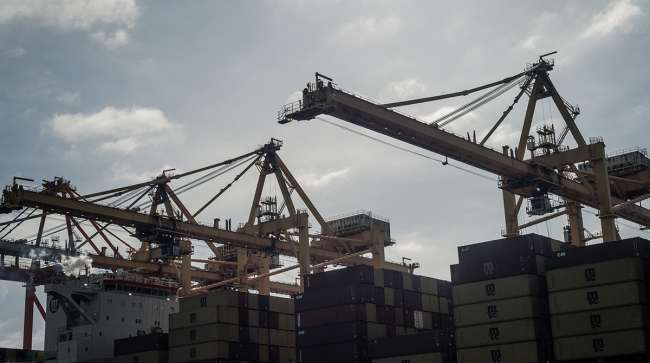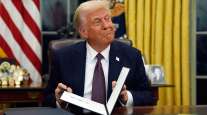Bloomberg News
EU, Mexico Seal Trade Deal as Trump Threatens Tariffs

[Stay on top of transportation news: Get TTNews in your inbox.]
The European Union and Mexico agreed to a revamped free-trade agreement, just as both are under pressure from President-elect Donald Trump, who has threatened them with a new round of tariffs.
The agreement aims to boost both trade and economic security by de-risking supply chains, securing a sustainable supply of critical raw materials and tackling climate change, according to a European Commission statement on Jan. 17. Bilateral trade in goods reached 81.7 billion euros ($84 billion) in 2023 while services trade was 22 billion euros in 2022.
Trump is set to upend international relations when he takes office Jan. 20, having threatened to start trade wars with friends and foes alike. He has repeatedly chastised the EU over its trade practices and said he would impose duties on its exports. He’s also said he’d impose 25% tariffs on goods from Mexico.
The agreement, which will need to be ratified by both sides, aims to expand EU exports in areas such as financial services and telecommunications, strengthen the supply chain of critical raw materials and allow access to government contracts on an equal footing to domestic firms. It will also slash tariffs on agri-food products such as cheese, poultry, pork, pasta, apples and jams as well as chocolate and wine.
EU-Mexico Modernised Global Agreement upgrades our Strategic Partnership.
It enhances our political dialogue & economic resilience, supports peace, international security & a ruled-based international order.
Today working with partners is pivotal.
➡️ https://t.co/Mq0Oriww6Z pic.twitter.com/xuh8fD6l5Z — European External Action Service - EEAS 🇪🇺 (@eu_eeas) January 17, 2025
The EU and Mexico began talks on a global agreement in 2016 and reached a deal in principle on trade aspects in 2018.
The EU has been working on expanding its trade defense measures and clinching bilateral agreements with other countries in an effort to boost its national security. The EU and the Mercosur countries of Brazil, Argentina, Paraguay and Uruguay finalized negotiations on a trade partnership last month.
The U.S. goods and services trade deficit with the EU was $131.3 billion in 2022, according to the office of the U.S. Trade Representative, and the EU has been bracing for a trade offensive ever since Trump’s election victory.
Mexico has been working to revamp the trade deal with the EU ahead of Trump’s inauguration as a way to show strength before the review of the U.S.-Mexico-Canada trade agreement, known as USMCA, scheduled for 2026, according to a person with knowledge of the talks. Leading Mexico’s efforts are Economy Minister Marcelo Ebrard and Foreign Affairs Minister Juan Ramon de la Fuente, the person said.
Although the U.S. accounts for 83% of Mexico’s trade relationship, the Latin American country is looking for new trade opportunities, Ebrard said Jan. 17 at an ITAM University event in Mexico City. He said he met earlier this month with the United Arab Emirates economy minister to look at areas of cooperation in semiconductors and renewable energy, among others.
Want more news? Listen to today's daily briefing above or go here for more info
“We are not only looking at the relationship with the United States, but it is the first one we are going to resolve, because it is the one that can generate more turbulence for us, but we are working with the European Union, for example,” Ebrard said. “And in the south, we are working with Brazil.”
Mexico also wants to improve its trade relationship with Brazil ahead of the USMCA review, a person familiar with the matter said.
The EU was largely caught off guard in 2017 when Trump, citing national security concerns in his previous term as president, levied tariffs on European steel and aluminum. The EU has since reinvented its trade doctrine and expanded its toolbox, giving it a range of options to counter coercive practices.
The EU has prepared a list of American goods it can target with tariffs if an alternative deal with the U.S. doesn’t happen and Trump follows through on his threat to hit European exports with protectionist measures.




